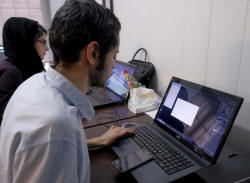Keeping the competition out: Iran startups thrive
despite sanctions
 Send a link to a friend
Send a link to a friend
 [October 06, 2017]
By Bozorgmehr Sharafedin [October 06, 2017]
By Bozorgmehr Sharafedin
LONDON (Reuters) - Low on cash but high on
hope, Iran's technology entrepreneurs are learning to live with revived
hostility in the United States and growing suspicion - or worse - from
hardliners at home.
Their startups and e-commerce apps are flourishing, driven by government
infrastructure support and young Iranians educated both in the country
and abroad. Some are even drawing foreign investment in a way that
Iran's dominant oil industry has yet to achieve since most international
sanctions were lifted early last year under a nuclear deal with world
powers.
Life remains tough despite the easing of Iran's international isolation.
The atmosphere in Washington has soured again, with President Donald
Trump signing legislation tightening domestic U.S. sanctions on Iran and
threatening to pull out of the nuclear accord.
On top of this, Google and Apple have withdrawn some services
temporarily or indefinitely for Iranian users in recent months for
reasons including the U.S. sanctions.
Still, the absence of U.S. giants such as Amazon and Uber has allowed
their Iranian equivalents Digikala and Snapp to grow rapidly. Many other
local internet firms are following suit.
Ramin Rabii, chief executive of Turquoise Partners, which facilitates
foreign investment in Iran, said Trump's rhetoric could paradoxically
help the tech sector.

"If he keeps talking about sanctions, that would increase the risk of
investment in Iran, but at the same time it will keep a lot of
competition out," he told Reuters in a telephone interview from Tehran.
"Major global players are not here."
No figures are available on foreign investment in Iranian tech firms.
Rabii, however, estimated it at hundreds of millions of dollars since
the nuclear deal came into force.
By contrast, an expected rush into Iran's huge energy reserves has yet
to materialize. French group Total is investing in a gas project but
Tehran has yet to seal any major oil deals with international partners.
Foreign investment in Iranian tech remains modest compared with regional
mega-deals such as Amazon's purchase in March of Dubai-based retailer
souq.com. Amazon did not reveal the price but beat off a rival offer
worth $800 million.
Still, Rabii sees a bright future. "Many foreign investors ask me what
is the best performing sector in Iran for the next decade. I always name
e-commerce and the tech sector," he said.
LOCAL INCARNATIONS
After the relative isolation of the international sanctions era, the
tech sector has attracted many young Iranians back from the United
States, Canada and Europe. They hope to marry their experience of the
startup scene with locally-educated talent.
Reza Arbabian left Canada, where he went as a teenager, to join his
family textile business in Iran. But in 2012 he launched Sheypoor, the
Iranian answer to Craigslist, a U.S. classified advertisements website.

Sheypoor now employs 200 and recently marked its fifth anniversary.
Cash, however, remains tight.
"Many foreign companies are still hesitant and Iranian investors don't
understand the value in e-commerce. They cannot accept that they need to
wait for five years for a startup to make profits," said Arbabian.
Some outside Iran, especially in Europe where the sanctions net is not
quite so tight, are nevertheless willing to take the plunge.
Swedish-based Pomegranate Investment, for instance, has taken a 43
percent stake in Sheypoor.
On a larger scale, Sarava, Digikala's main shareholder, is 45
percent-owned by foreign investors. These include Pomegranate, which
raised its stake to 15 percent with a 41 million euro ($48 million)
investment in 2016.
Following the Amazon model, Digikala has grown into Iran's biggest
internet company with a market share of 85-90 percent, according to
Pomegranate. Staff numbers have leapt in the past two years from 800 to
more than 2,000.
INFRASTRUCTURE
Iran came late to mass internet access but has invested heavily under
President Hassan Rouhani, hoping to attract foreign cash and create more
jobs.
According to the Measuring Information Society of Iran, a
government-linked portal, more than 62 percent of households were
connected to the internet by March 2017. This was up from only 21
percent in 2013, the year Rouhani took office.

[to top of second column] |

Employees work with their laptops at Takhfifan company in Tehran,
Iran January 19, 2016. REUTERS/Raheb Homavandi/TIMA//File Photo

Smartphone ownership has also rocketed. Iran, a country of 80 million people,
had only two million smartphone users three years ago but the number hit 40
million in 2016.
Such developments encouraged Kamran Adle, an Iranian born and raised in London,
to move to Tehran last year.
"Iranian infrastructure has dramatically improved in recent of years. 3G and 4G
is much more commonplace than it was a couple of years ago," said Adle, whose
firm Ctrl+Tech invests in early stage startups and helps them to develop apps.
Some Iranian apps are copies of foreign equivalents, made out of the reach of
international lawyers. But the years of isolation also forced domestic talent to
be more innovative, and Adle says there is no shortage of app developers.
One such is Farshad Khodamoradi, who has designed the app for a job-hunting
startup being launched this month. Unlike traditional sites, "3sootjobs" will
use an algorithm-driven matching system to connect candidates with the right
employers.
Khodamoradi complains about difficulties in accessing foreign tech services,
many of which are U.S.-based. "The main problem is that the global services
Iranian startups are using can be cut off overnight," he told Reuters from
Tehran.
He cited Google's Firebase, a platform used to generate push notifications -
such as messages to passengers that a taxi has arrived to pick them up - without
their having to open the app.
This was unavailable in Iran on a number of occasions in June and July,
disrupting startups including taxi hailing apps, he said. Google did not respond
to Reuters requests for comment.

Although technology firms can gain exemptions from the sanctions, U.S.
corporations appear unwilling to risk involvement in Iran. In August,
Telecommunications Minister Mohammad Javad Azari Jahromi threatened to take
legal action over Apple's removal of Iranian apps from its app stores. Apple did
not respond to Reuters requests for comment.
MESSAGE FROM OBAMA
All this seems in contrast to U.S. promises after the nuclear deal. In March
2016, in a message to the Iranian people, then President Barack Obama said
ending international sanctions "would mean more access to cutting-edge
technologies, including information technologies that can help Iranian
startups".
Since that message, anti-U.S. Iranian hardliners have followed the growth of
startups suspiciously, branding them as vehicles of enemy infiltration. Two
foreign-based tech investors have also ended up in prison.
Nizar Zakka, a Lebanese information technology expert with permanent U.S.
residency, was jailed in 2016 for 10 years for collaborating against the state.
He had attended a conference in Tehran the previous year at the invitation of
one of Iran's vice presidents, only to be arrested by the Islamic Revolutionary
Guards Corps as he was going to the airport to leave the country.
Iranian-American businessman Siamak Namazi also got 10 years in 2016 on charges
of cooperating with the United States. While under arrest, Namazi appeared in an
Iranian documentary seen by Reuters in which he said his mistake had been to
accept money for his startup from an organization linked to the U.S. Chamber of
Commerce.
The Revolutionary Guards, a military force that runs an industrial empire,
largely control telecommunications in Iran.
However, tech entrepreneurs say the environment is generally supportive. "We
haven't come across any of those governmental push-backs," Adle said.

In the longer term, the sanctions would make using the souq.com model to cash in
on Iranian investments much harder.
But Eddie Kerman, of London-based Indigo Holdings which links retail investors
to Iranian tech firms, is optimistic.
"American companies like Amazon might not be able to enter the Iranian market,
but there is a significant possibility that European or Asian companies buy the
larger Iranian players," he said.
(Reporting by Bozorgmehr Sharafedin; editing by David Stamp)
[© 2017 Thomson Reuters. All rights
reserved.] Copyright 2017 Reuters. All rights reserved. This material may not be published,
broadcast, rewritten or redistributed. |